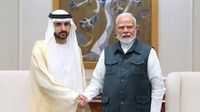The Dubai Crown Prince, Sheikh Hamdan Bin Mohammed Al Maktoum, recently visited India, marking a significant step in enhancing ties between the United Arab Emirates (UAE) and India. As the Deputy Prime Minister and Minister of Defence of the UAE, Sheikh Hamdan’s visit included meetings with key Indian leaders, including Prime Minister Narendra Modi, and various ministers overseeing defence, foreign affairs, and industry. This visit resulted in the signing of several agreements aimed at bolstering cooperation between the two nations.
Following their meeting, Prime Minister Modi expressed his enthusiasm on social media platform X, stating, "Glad to meet HH Sheikh Hamdan bin Mohammed bin Rashid Al Maktoum, the Crown Prince of Dubai. Dubai has played a key role in advancing the India-UAE Comprehensive Strategic Partnership. This special visit reaffirms our deep-rooted friendship and paves the way for even stronger collaboration in the future." Sheikh Hamdan echoed this sentiment, noting that their discussions reaffirmed the strength of the UAE-India relationship, which is built on trust and a shared vision for future prosperity.
The relationship between India and the UAE has been flourishing over the years, with around four million Indians residing in the UAE, primarily in Dubai. The UAE stands as India's third-largest trading partner, its second-largest export destination, and the fourth-largest source of Foreign Direct Investment (FDI). Recent statistics show that India's crude oil imports from the Middle East have risen from 51% in December 2024 to 53.89% in January 2025, underscoring the need for secure energy supplies.
During the visit, Sheikh Hamdan held a delegation-level discussion with Indian Defence Minister Rajnath Singh. A press release from the Ministry of Defence revealed that both leaders expressed satisfaction with the existing Coast Guard cooperation and committed to formalizing this through a Memorandum of Understanding (MoU). Singh stated, "In the coming years, we are eager to work closely in areas such as defence cooperation, co-production and co-development projects, innovation, and technology. Both India and the UAE are committed to work towards peace and prosperity in the region."
India and the UAE have established a framework for military engagement, with regular high-level exchanges at the level of Service Chiefs and military education. The Indian Embassy in Abu Dhabi highlights that naval ships from both nations have made port calls, enhancing bilateral defence cooperation. The two countries hold an Annual Defence Dialogue to discuss security issues, which is steered through a Joint Defence Cooperation Committee at the Ministry level.
In recent years, India and the UAE have conducted joint naval and air power exercises, demonstrating their commitment to enhancing interoperability. India has appointed a defence attaché to its Abu Dhabi mission since 2015, which has further strengthened cooperation. Furthermore, India maintains a listening post in Oman and has berthing rights at the Muscat naval base, facilitating military collaboration.
During Sheikh Hamdan's visit, discussions focused on the joint production of defence equipment under the 'Make in India' and 'Make in the Emirates' initiatives. India offered its indigenous Akash air defence missile systems to the UAE, while talks about the UAE procuring BrahMos missiles are ongoing. The two countries identified Coast Guard cooperation as a priority area for enhancing regional security.
In February 2024, PM Modi visited the UAE, where a bilateral investment treaty was signed, further solidifying economic ties. Modi is also scheduled to visit Saudi Arabia later this month to discuss a potential defence agreement, which may include joint military exercises and increased exchanges.
India's growing influence in the Middle East, particularly through military agreements, is seen as a strategy to counter Pakistan’s influence in the region. The multifaceted relationship between India and the UAE encompasses trade, military diplomacy, and intelligence sharing. Indian security agencies have successfully sought the deportation of individuals from the UAE who were wanted in India.
In addition to defence cooperation, India and the UAE have increased collaboration in areas such as counter-terrorism and cyber security. The UAE's financial resources are expected to support defence research in India, benefiting both nations. Sheikh Hamdan's recent visit is anticipated to further enhance defence cooperation between the UAE and India.
Meanwhile, in a related development, Lazard, the global investment bank, is expanding its presence in the UAE by opening a new office in Abu Dhabi. This office will serve as Lazard's main financial advisory hub in the country. CEO and Chairman Peter Orszag expressed excitement about reinforcing their presence in the UAE, a country he described as having remarkable opportunities.
Abu Dhabi has attracted a plethora of global banks, including Morgan Stanley and Goldman Sachs, which have established operations to cater to a diverse pool of wealthy clients, including sovereign funds managing almost $2 trillion. As part of its expansion, Lazard appointed Hussain Altajir as the CEO of Lazard Financial Advisory in the UAE. Altajir previously led Dubai coverage for global banking at HSBC and will focus on enhancing Lazard's engagement with clients in the region.
This dual focus on defence and financial services highlights the UAE's strategic importance in the global economy and its growing role as a hub for investment and military collaboration.


